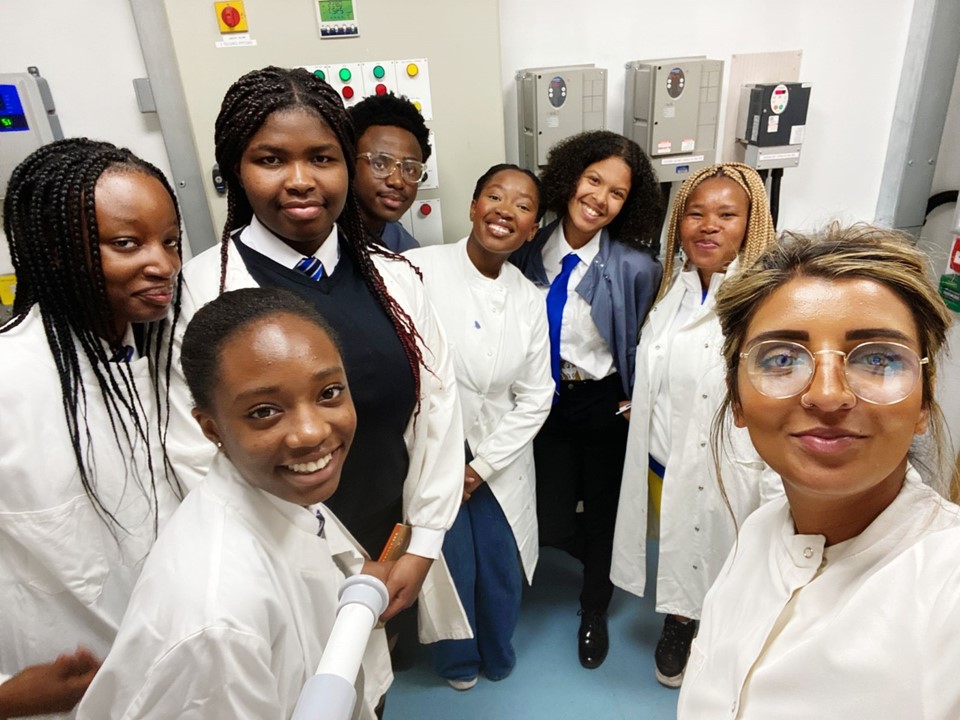This project, led by Dr Safi Darden and Dr Melody Kuziwa Jombe, alongside colleagues from across Exeter, looks to highlight the need for Black educators and Higher Education (HE) role models for Black youth, to encourage a greater sense of belonging in the academic community.
Partners: Safi Darden, Melody Kuziwa Jombe, Caitlin Searle, Wahida Sussex, and Steve Brown
Our project has run in partnership with St James School in Exeter, with whom we have been working since September 2023. The initial discussions began when we were contacted by St James School to discuss the possibility of recruiting Black women academics from the Exeter’s 2023 100 Black Women Professors NOW (100 BWPN) cohort to join the school in centring Black role models in the UK higher education sector. Driven by severe underrepresentation of Black educators in the Southwest and beyond in the UK under 16 education sector, the common purpose for the partnership is twofold. Firstly, it aims to observe the effects of having Black, Higher Education professionals as role models for Black high school students in Exeter. Secondly, we hope to use this knowledge to address the deficit in Black educators within this setting. We applied to the Bridging Communities Fund to cover a budget that would provide logistical support for partner members to plan in detail and implement the research and data analysis.
Together with our project partner, and in line with our proposal, we designed a series of interventions to investigate how access to Black role models in the education sector affects feelings of belonging and expectation both at school and in a higher education setting. The core intervention was a 12-week programme that brought Black high school pupils to our campuses one afternoon per week with participation from 12 hosts, all Black academics at the University of Exeter, with the exception of one host who is a Black USA-based academic who joined us virtually. We developed activities and materials with hosts, guided by input from our participants’ expertise – ranging from mock court cases to hands-on medical imaging practicals. Qualitative data was collected by participants in peer interviews and focus group discussion where each participant had the opportunity to input suggested topics and ideas.
We are carrying out additional qualitative data collection using semi-structured interviews of our programme “role models”. With our funding we were able to hire one part-time student research intern and we were fortunate to secure further funding from the Business School for a second intern to work with us on the project. These two young people have been instrumental in the success of these sessions, and the overall project. We also used our funding to provide Above and Beyond Award vouchers for our role models, and gift cards to our UG student panellists to recognize the commitment that each of these individuals made.
The funding allowed us to engage more deeply with our project partner to have important conversations about Black pupil experiences at school and interventions in the school setting that were proposed by participants. We truly feel that our partnership has been cemented and our vision for the research continuously developed. Our initial analysis of participant data suggests that increased sense of identity and belonging were at the core of the experience of our participants on the programme, likely driven by numerous programme elements that we will be building on in the coming year.
Moving forward, we are now committed to continue pursuing questions of belonging and expectations, but also tracking the academic decisions and outcomes for Black high school pupils. Following this project, and seeing the commitment of our project partners, we are keen to use participatory research to support positive impact in this area.
We know that representation is important – for driving aspirations and expectations, but also for generating a whole host of effects crucial for social equity. We have become particularly interested in how experiences in the U16 educational setting affect experiences and outcomes in the post-16 education sector. We have gone on to partner with a second school in Exeter, and are broadening the methods used in our research across a wider range of students. We are fortunate to have received additional funding to support this project, including from the Centre for Social Mobility and an Engaged and Participatory Research Fund award, and will work with partner organizations to answer valuable questions regarding the U16 experience in the South West. Together, we will increase access to Black higher education role models, benefitting both our research professionals, and Black youth in the region. In the longer-term we expect to see persistent positive social change in the secondary school community, particularly in the form of better experiences and outcomes for Black youth entering HE.

